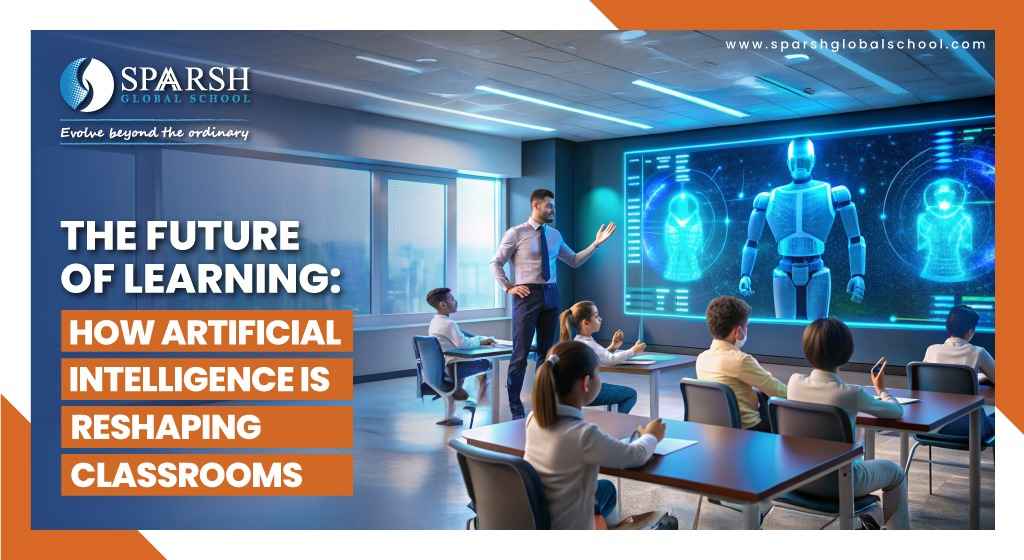The future of education and the way the world would be run in the future can be predicted from the way we are witnessing a disruptive change being brought about by technology. Right from early education to business organisations, there is not a single field where Artificial Intelligence (AI) isn't already or cannot make a significant impact. It has become imperative that the seeds of technology be ingrained in education from an early age and that schools should be responsive to these changes.
Artificial intelligence is understood as the ability of machines to work and learn like human beings. In the context of education, this means that machines are capable of providing better match and more efficient help to students in their learning activity. In this regard, let’s delve into how to understand with the help of AI the process of altering education and its role in defining the classrooms of tomorrow.

Personalised Learning
Personalised learning is AI’s biggest strength in education, according to the experts. After all, when it comes to students, everyone is different and may not learn at the same speed or grasp concepts the same way. This means that AI can use data on how a student progresses and change the content according to their level. This further indicates that students can work at their rate and receive relevant support at a suitable time. Picture a class in which every student can have their virtual tutor throughout the day.
Automation of Administrative Tasks
Teachers spend a lot of time doing administrative work. These are tasks that can be taken over by AI, which will give back to teachers the time to focus more on teaching and engaging with students. Additionally, AI can identify patterns in student performance and alert teachers to potential issues before they become insurmountable.
Personalised Educational Content
AI recognises where individualisation of content is needed and customises the same. AI creates learning materials tailored to each student. For instance, if a student likes Biology and Ancient History, AI can design learning modules covering both subjects. This encourages students to be curious, have means to a vast content library on their subjects of interest and therefore easily be able to explore these in details.
Virtual Tutoring and Online Interaction
Tutoring is an important aspect of the study area. In what way can AI virtual tutors answer questions, provide examples and give immediate feedback to students? Also, how does AI help students across the globe connect online?
Data Analysis and Educational Predictions
AI can analyse massive amounts of educational data and can allow for trend analysis. This will be especially helpful for school administrators and decision-makers in education. AI helps predict the performance of students and assists in creating a strategy to enhance results. It can also highlight the needs that require more attention.
Access to Education - Anytime, Anywhere
AI is not confined by time or space. Learners can log in to the content at any time, from anywhere. This is extremely relevant for those who struggle to attend classes in person because of geography or job responsibilities. Online education with the use of AI is flexible and accessible.
Development of 21st Century Skills
Education is not only about gaining knowledge, but also imparting necessary skills. AI helps one gain the most relevant 21st-century skills like critical thinking, problem-solving, collaboration and communication. Students can practise what they learn in the classroom with simulations and interactive scenarios to see how these actually unfold in the real world.
Identification and Support for Diverse Learning
Some students have special needs; others do not, but they are all unique. AI can detect which students need more assistance and what they require. From this moment, schools can identify early learning challenges and adapt teaching strategies to be more effective to all.
Challenges and Ethics of AI in Education
AI has many benefits, but these advances in education also present new challenges and ethical dilemmas. What about student data privacy, accessibility and fairness in algorithms? The debate is ongoing.
Conclusion
AI has the potential to change the teaching-learning process. Adaptive, personalised and automated capabilities of AI provide educational institutions with the tools necessary to equip students for a changing world. Sparsh Global School is a perfect example of the judicious use of such innovative technologies, enabling students to get customised learning and hone skills in a variety of fields. Amidst the fight for education, Sparsh Global School makes a paradigm shift by adopting AI as a method to widen and upgrade the learning experience to fit in seamlessly anywhere in the ever-changing world.
FAQ
1. How does AI contribute to personalised learning in education?
AI customises the learning experience by analysing individual student data and adjusting content based on each learner's progress and needs. This ensures that students can learn at their own pace and receive tailored support, enabling a more effective and engaging educational journey.




